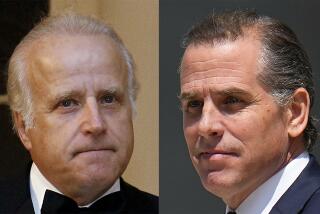FBI Broadens Commodities Fraud Inquiry
- Share via
CHICAGO — The FBI broadened its investigation Tuesday into commodities trading fraud on the Chicago Board of Trade and the Chicago Mercantile Exchange when its agents served subpoenas on a wide array of member firms of both exchanges.
Federal investigators refused to comment, but it appeared that as many as 200 firms in the city’s financial district, including virtually every major trading house on both exchanges, received federal subpoenas for trading records dating back at least to 1983.
Officials at both exchanges confirmed Tuesday that at least some member firms had received subpoenas, but they couldn’t provide figures on how many had been served.
Tuesday’s action was the first time since the government’s undercover probe was revealed last week that trading houses have been served with subpoenas. Before, the government had only served individual traders and the two exchanges themselves. The investigation is being led by U.S. Atty. Anton R. Valukas.
One top Chicago attorney whose firm represents commodities companies said the subpoenas may signal that the federal probe is expanding beyond individual traders to include trading houses as well.
At least some of the subpoenas seemed to be a fairly routine part of the grand jury investigation, a sweeping legal precaution against the destruction of back records that might be needed in the future. Some traders estimated that the subpoenas cover anywhere from 500 million to 1 billion past trades on the two exchanges and clearly don’t imply guilt on the part of all member firms.
But commodities traders and attorneys involved in the case said some of the subpoenas handed out Tuesday sought records for specific trades on specific dates. Such requests suggest that the government is seeking to establish a “paper trail” behind the fraud uncovered by its undercover agents who posed as traders on the floors of both exchanges.
Traders said Tuesday that some subpoenas also sought back records of unfilled customer orders, indicating that federal investigators are looking into the possibility that brokers on the floor have been cheating or shortchanging their outside customers.
Meanwhile, a federal grand jury is meeting this week to begin to take testimony in the case, which may involve as many as 100 traders on both exchanges.
One commodities attorney, a former assistant federal prosecutor, said traders and brokers who have been subpoenaed are scheduled to go before the grand jury today, initially to give handwriting samples to the panel. Witnesses who have agreed to cooperate are scheduled to begin giving testimony next week, he said.
In what may be this week’s most dramatic development in the widening commodities scandal, traders on the Chicago Board of Trade said Tuesday that some individual floor traders sought to boycott trading with the company that provided cover to the FBI agents who infiltrated the exchange’s pits. Archer-Daniels-Midland Co., the world’s largest soybean processor, trained two FBI agents in commodities trading, and their lengthy undercover sting operation has formed the heart of the federal investigation at the exchange.
Unusual Move
On Monday, some individual floor traders in the Board of Trade’s soybean pit, where an FBI agent known as Richard Carlson had spent most of his time while he was under cover, refused to do business with ADM Investor Services, Archer-Daniels-Midland’s Chicago-based commodities trading arm.
“They had difficulty getting independent traders to fill their orders,” said John Troelstrup, a Chicago commodities lawyer.
In a highly unusual move, ADM’s Board of Trade floor manager, or supervisor, was forced to step into the soybean pit and personally handle ADM’s trading because independent traders, especially in the “top step” section of the soybean pit where Carlson had worked, were refusing to do so, traders said Tuesday.
Large grain processing companies such as Archer-Daniels-Midland often use both in-house and independent traders to execute their trades, industry observers said.
Traders said the Monday boycott was a protest against ADM’s involvement in the sting operation and shows the depth of resentment starting to well up among traders against the federal investigation.
“In the area where Carlson used to stand, the traders decided they didn’t want to take any ADM business,” said one executive of a trading firm. “There is not a real good feeling about ADM, that’s obvious.”
“Nobody wanted to do business with ADM,” said Randy Wells, a vice president at Balfour Maclaine, a major Chicago trading firm. “Nobody wanted to touch their paper (futures contracts).
Refused to Comment
“The feeling is, they put everyone’s livelihood in danger,” by providing a cover for the sting operation, Wells added. “If they had a problem, why didn’t they go to the Board of Trade itself?”
An ADM spokesman at the firm’s Decatur, Ill., headquarters refused to comment on possible resentment against ADM among floor traders in Chicago. He said only that “trading was normal” Tuesday but refused to comment on whether ADM had encountered trouble in the pits on Monday.
James Risen reported from Detroit and Larry Green from Chicago.
More to Read
Inside the business of entertainment
The Wide Shot brings you news, analysis and insights on everything from streaming wars to production — and what it all means for the future.
You may occasionally receive promotional content from the Los Angeles Times.










